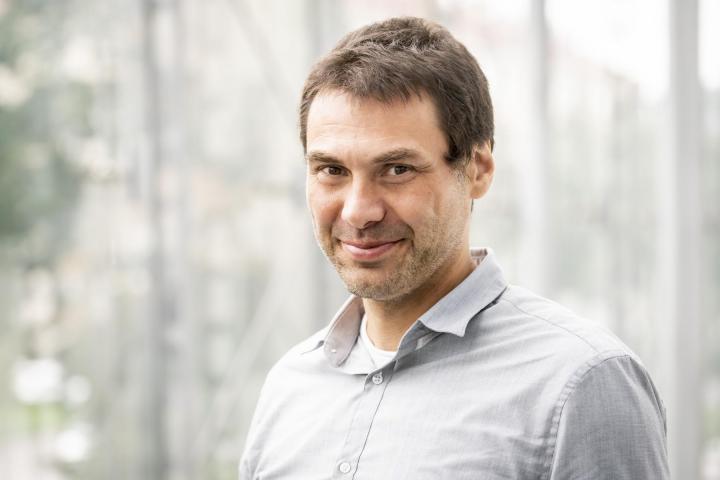
The FRONTIER project combines computer vision, machine learning and robotics to develop a new neural architecture that combines large-scale neural networks with learning physical simulation components. Artificial intelligence can now solve tasks that are difficult for humans to manage, such as generating computer programs or creative images. Conversely, other tasks that humans find trivial and do every day, such as perceiving and interacting with the environment, are very difficult for machines. Commonly used industrial robots are pre-programmed for one specific task and are unable to solve other tasks in a changing three-dimensional world. And this is also a challenge for Josef Šivic and his team.
Their research will design new algorithms that enable learning complex multi-step tasks from just a few examples. This is similar to the way humans can learn. The most ambitious goal is to develop algorithms that allow machines to share their experience with each other and thus learn to interact better and faster with the outside world. But this is very difficult because individual machines will be solving different tasks in different environments.
"Our challenge is to develop primary neural models for systems with physical bodies that take into account the physical and geometric structure of the world, and allow for sharing and generalizing lessons learned across different systems, tasks, situations, and environments," says Dr. Josef Šivic, explaining the practical applications, "Examples include a robot as a home assistant, a robot in a factory, a self-driving car, or even a robot surgeon. All of these systems have a physical body, so they need to perceive the world around them, think about it and interact with it. But current large neural models are not capable of doing this, or have very limited capabilities in this regard."
Breakthroughs on these issues would have a major impact on our daily lives and the economy. For example, the results of this research could lead to safer cars that share their experiences with each other, intelligent production lines that adapt to new workflows together, or a new generation of intelligent assistive robots that automatically learn new skills from the Internet and each other.
"Applications for ERC grants are evaluated by panels of world-renowned scientists, and the competition of high-quality projects is enermous," says Professor Vladimír Mařík, Scientific Director of the CIIRC CTU. "At our institute, we strive to create an environment that allows researchers to conduct truly groundbreaking research, and I am very pleased that Dr. Šivic will carry out his FRONTIER project here and with our all-round support. It is also important for Czech science to have truly original scientists working here."
The European Research Council (ERC) announced the award of 218 Advanced Grants to outstanding research leaders across Europe under Horizon Europe on Thursday 30 March 2023. The grants, totalling €544 million, support cutting-edge research in a wide range of disciplines, from medicine and physics to the social sciences and humanities. This year, the Czech Republic has been awarded four of these grants. The evaluation panels assessed 1650 applications with an overall success rate of 13.2%, with the Czech Republic being less successful than other countries in winning these grants in the long term.
Further information
Dr. Josef Šivic is head of the research group focused on intelligent machine perception at Czech Institute of Informatics, Robotics and Cybernetics at Czech Technical University in Prague and director of the ELLIS Unit Prague. Since 2022, he is also the chairman of the AICzechia initiative, which brings together forty leading academic teams and departments, mainly at universities and research institutions in the Czech Republic, through key experts in the fields of artificial intelligence. His research group also contributes to the fact that CTU has long been ranked among the top five European institutions in computer vision (CSRankings for the period 2018-2023) and he himself is among the best Czech computer scientists (more information here).
After graduating with a Master's degree from CTU in 2002, he spent more than 15 years abroad, including a PhD at University of Oxford in the UK, a postdoctoral fellowship at Massachusetts Institute of Technology in the USA, and more than 10 years at the French National Research Institute of Informatics (Inria) in Paris, France, where he received an ERC Starting Grant. Since 2017, he has been working at CIIRC of CTU, where he leads the 111 million CZK OP R&D IMPACT project that enabled his return to the Czech Republic. He has co-authored more than 100 scientific publications. His scientific work has won the Helmholtz Prize and the Longuet-Higgins Prize for fundamental contributions to computer vision.
---
The ERC - European Research Council was established in 2007. The ERC awards grants from the European Union budget to support excellent science in all fields. The ERC does not support networks or international consortia, but individual researchers and their research teams. The investigator can be of any nationality, but the chosen host institution must be located in an EU Member State or a country associated to the EU Framework Programme. The only evaluation criterion is scientific excellence - both of the project proposal and of the investigator. This requires, in addition to previous achievements in the field, that the researchers come up with a completely new and revolutionary idea that is not a mere continuation of their previous achievements, which can significantly influence the field, push its boundaries or open new research perspectives.
The ERC offers four core grant programmes: Starting Grants, Consolidator Grants, Advanced Grants and Synergy Grants. Through another grant programme, Proof of Concept, the ERC helps grantees bridge the gap between their research and the early stages of commercialisation. The ERC has a total budget of more than €16 billion for the period 2021-2027 under the Horizon Europe programme, which is the responsibility of Mariya Gabriel, European Commissioner for Innovation, Research, Culture, Education and Youth.